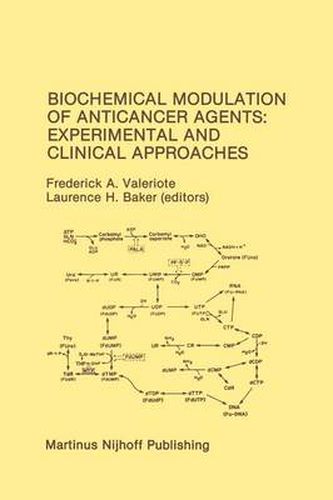Readings Newsletter
Become a Readings Member to make your shopping experience even easier.
Sign in or sign up for free!
You’re not far away from qualifying for FREE standard shipping within Australia
You’ve qualified for FREE standard shipping within Australia
The cart is loading…






This title is printed to order. This book may have been self-published. If so, we cannot guarantee the quality of the content. In the main most books will have gone through the editing process however some may not. We therefore suggest that you be aware of this before ordering this book. If in doubt check either the author or publisher’s details as we are unable to accept any returns unless they are faulty. Please contact us if you have any questions.
Biochemical Modulation at the present time defines an area of study in which the intracellular metabolism of a given anti cancer agent is modulated (usually by a noncytotoxic agent or a cytotoxic agent at sufficiently low dosage to make it non cytotoxic) in order to either increase the effectiveness of the particular agent against tumor cells or decrease its cytotox icity against normal cells. The major focus of modulation has been the agents 5-fluorouracil (FUra), arabinofuranosylcytosine (ara-C), methotrexate (MTX) and a few alkylating agents. The major thrust of the studies has been to increase the flow of the anticancer agent along the pathway responsible for the formation of the cytotoxic species: for example, FUra to FUTP or ara-C to ara-CTP. While in most cases the application of research re sults to clinical trials does not require the subsequent exper tise of the laboratory researchers, application of biochemical modulatory schemes to clinical protocols necessitate a dramatic break with the past procedures. As shown in the laboratory clinical loop below, close collaboration between the laboratory and clinical investigator is essential. While the laboratory REDEFINE TECHNOLOGY, TESTS OR QUESTIONS FOR FURTHER THERAPEUTIC ADVANCE CLINICAL EXPERIMENTAL PROTOCOL (LABORATORY) RESEARCH STUDIES DEFINE AND TEST APPROPRIATE SCIENTIFIC PARAMETERS results define rationally-based regimens, it is essential that the clinical protocols contain the requirement that clinical material (either tumor or normal tissues) be sampled to deter mine whether the biochemical modulation being proposed is in fact beinq accomplished.
$9.00 standard shipping within Australia
FREE standard shipping within Australia for orders over $100.00
Express & International shipping calculated at checkout
This title is printed to order. This book may have been self-published. If so, we cannot guarantee the quality of the content. In the main most books will have gone through the editing process however some may not. We therefore suggest that you be aware of this before ordering this book. If in doubt check either the author or publisher’s details as we are unable to accept any returns unless they are faulty. Please contact us if you have any questions.
Biochemical Modulation at the present time defines an area of study in which the intracellular metabolism of a given anti cancer agent is modulated (usually by a noncytotoxic agent or a cytotoxic agent at sufficiently low dosage to make it non cytotoxic) in order to either increase the effectiveness of the particular agent against tumor cells or decrease its cytotox icity against normal cells. The major focus of modulation has been the agents 5-fluorouracil (FUra), arabinofuranosylcytosine (ara-C), methotrexate (MTX) and a few alkylating agents. The major thrust of the studies has been to increase the flow of the anticancer agent along the pathway responsible for the formation of the cytotoxic species: for example, FUra to FUTP or ara-C to ara-CTP. While in most cases the application of research re sults to clinical trials does not require the subsequent exper tise of the laboratory researchers, application of biochemical modulatory schemes to clinical protocols necessitate a dramatic break with the past procedures. As shown in the laboratory clinical loop below, close collaboration between the laboratory and clinical investigator is essential. While the laboratory REDEFINE TECHNOLOGY, TESTS OR QUESTIONS FOR FURTHER THERAPEUTIC ADVANCE CLINICAL EXPERIMENTAL PROTOCOL (LABORATORY) RESEARCH STUDIES DEFINE AND TEST APPROPRIATE SCIENTIFIC PARAMETERS results define rationally-based regimens, it is essential that the clinical protocols contain the requirement that clinical material (either tumor or normal tissues) be sampled to deter mine whether the biochemical modulation being proposed is in fact beinq accomplished.